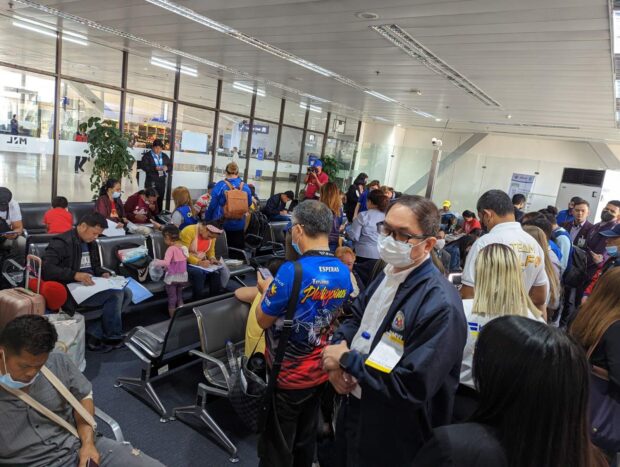146 Pinoys still reluctant to leave Sudan

Filipino evacuees from war-stricken Sudan arrive at the Ninoy Aquino International Airport – Terminal 1 in Pasay City on Thursday, May 4, 2023. (Photo from the Department of Migrant Workers)
Efforts are still being made to convince the remaining Filipinos still in Sudan to go home to the Philippines, as some have expressed their intention to stay in the conflict-ridden country despite the military infighting that has killed hundreds of civilians.
So far, the government has successfully evacuated more than 600 Filipinos from Khartoum, Sudan’s capital and the center of conflict. Some 85 Filipinos who flew from Cairo, Egypt, arrived in Manila on Friday afternoon bringing to 274, the total number of repatriated Filipinos based on the Overseas Workers Welfare Administration’s count. More than 300 displaced Filipinos are still in Cairo, Jeddah, Saudi Arabia, and Athens, Greece, waiting to fly back home.
Migrant Undersecretary Hans Cacdac, said of the 750 Filipinos in Sudan, they were still contacting 146 who have not manifested any intent to leave Sudan to convince them to go back to the Philippines.
“We really need to convince our kababayans. Ezzedin Tago (Philippine Ambassador to Egypt) even said that some Filipinos [in Sudan] are saying they are in a safe place” Cacdac said.
“The situation is unpredictable. We can’t determine with certainty the safe zones or safe havens, so it’s best to have them repatriated to get out of Sudan and so we know for sure they are safe,” Cacdac urged.
Shooting began in several parts of Sudan two weeks ago as the top two leaders of the military government are in conflict, resulting in armed conflict even in densely populated urban areas, resulting in more than 400 civilian deaths, according to the Sudan Doctors’ Syndicate.
“We all say in complete unison, this is not the time to hesitate and not the time to not think about safety and security. It’s time to come home, spend time with your loved ones,” Cacdac pleaded.
With more and more Overseas Filipino Workers coming back, the Department of Migrant Workers (DMW) has been in contact with several countries like the United States, Japan and the Kingdom of Saudi Arabia for alternative job opportunities.
“The good news here is the Association of Recruitment Agencies, where more than 50 licensed recruitment agencies are members, has existing valid job orders. And they run into thousands,” Undersecretary Bernard Olalia said.
Olalia said the jobs were in various industries like health, food processing, construction, corporate and other areas that would be good alternatives for their Sudan jobs.